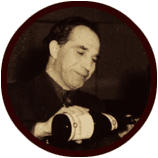The One-Man Radio Department
In 1992, Yiddish historian and sound archivist Henry Sapoznik got a phone call
from a woman who said she was the widow of a former Jewish radio personality.
She was moving out of her house in Queens and wondered if Sapoznik might want
to haul off some of the materials her husband had left behind. Soon, Sapoznik
was making his way down the basement stairs that led to her late husband's office.
When he entered the room, he was astounded.
Sapoznik had descended into a veritable King Tut's tomb of Yiddish radio, where
nothing appeared to have changed in decades. All around were stacks of photos,
radio scripts, and dozen and dozens of 16" acetate discs.
This was the legacy of Victor Packer, an eccentric broadcaster whom the fates
had granted a multi-year license to transmit whatever boiled to the surface
of his overheated imagination.
From the late-1930s to 1942, Victor Packer served as Jewish Program Director
of Brooklyn's low-budget station WLTH. The title and function don't sound unusual
until you listen to the discs in Packer's collection and begin to realize that
Packer was WLTH's Jewish division. His charge: to fill -- as writer,
director, host, and anything else necessary -- four hours of radio a day in
15-minute increments, each distinct from the last.
The one-time Yiddish theater actor took to the challenge with a total lack
of inhibition. Ideas that sprang into his head one day were on the air the next.
In one segment, listeners might hear him recite avant-garde literary masterpieces
like his epic sound poems about New York City life, which presaged the beat
poetry of 1950s America. The recitation over, Packer would metamorphose from
bard to buffoon -- say, as host of the "Hammer's Beverage Program,"
an insipid children's show on which Raisele and Sheyndele, "the Happy Twins,"
sang cloying Yiddish and English ditties punctuated by senseless patter, with
Packer as the butt of every joke.
As the day proceeded, Packer co-hosted talent and game shows with his English-language
announcer, Norman Warembud, conducted man-in-the-street interviews, acted and
directed in serial dramas, and created a variety of programs that still defy
categorization. Case in point: the 11-minute "To Marry or Not to Marry,"
a heated dialogue on the topic of marriage, in which only one side of the conversation
is audible. (Fully seven minutes of the broadcast comprise perfect
silence.)
Packer sustained his manic production of radio creations until WLTH went off
the air in 1942. After that, he hosted the occasional show on several of New
York's other Yiddish stations. But never again would his maverick radio sensibilities
be given free rein.


